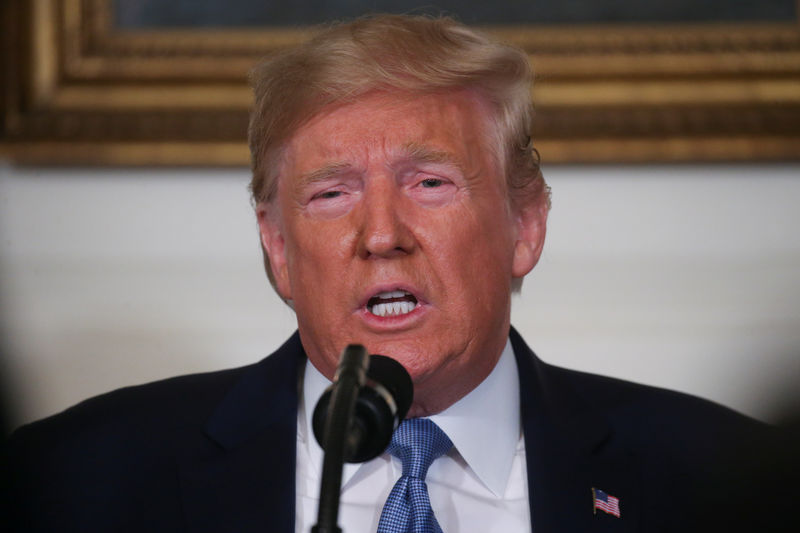By Roberta Rampton
WASHINGTON (Reuters) - U.S. President Donald Trump on Friday said he was not ready to make a deal with China and even called a September round of trade talks into question, reviving concerns on financial markets that the bilateral dispute is unlikely to end anytime soon.
Trump also sowed confusion by saying that the United States would not do business with Chinese telecoms giant Huawei Technologies, only to have a White House official later clarify that he was referring to a ban on U.S. government purchases of Huawei equipment, not requests for sales by U.S. companies, which are still being assessed.
"We're talking with China. We're not ready to make a deal - but we'll see what happens," Trump told reporters at the White House before departing for fundraisers on Long Island, New York.
"China wants to do something, but I'm not ready to do anything yet. Twenty-five years of abuse - I'm not ready so fast, so we'll see how that works out," he said.
Ties between the world's two largest economies have deteriorated dramatically since Trump announced on Aug. 1 that he would impose a 10% tariff on a final $300 billion worth of Chinese imports on Sept. 1, prompting China to halt purchases of U.S. agricultural products.
The United States also this week declared China a currency manipulator after it allowed the yuan to slip below 7 to the dollar.
U.S. stocks fell on Friday, capping a week of trading that saw big swings and high volume. All three indexes were down more than 1% in early trading and rebounded later in the session.
The Dow Jones Industrial Average (DJI) fell 90.75 points, or 0.34%, to 26,287.44, and the S&P 500 (SPX) lost 19.44 points, or 0.66%, to 2,918.65.
"It has been a very volatile week," said Elwin de Groot, Rabobank's head of macro strategy. "Until recently, the markets' view was that this trade war will be resolved, but clearly now the thinking is that maybe this is not the case and it could be accelerating from here."
The International Monetary Fund on Friday said China's yuan valuation was largely in line with economic fundamentals, but an IMF official said the fund was encouraging China to pursue a more flexible exchange rate with less intervention.
Trump stood by his administration's currency accusation, saying that the fact that China was subsequently able to stem the yuan's slide
HUAWEI WAIVER PROCESS CONTINUES
Trump's early comments on Huawei initially dashed hopes that the U.S. Commerce Department would soon approve some licenses for American companies to resume some sales to Huawei.
"We are not going to do business with Huawei," Trump said, adding that it did not mean that would not change if a trade deal was done. "I really made the decision it's much simpler not to do any business with Huawei."
But the Commerce Department said on Friday it was still reviewing requests for special licenses for some sales to Huawei. Commerce Secretary Wilbur Ross last month had said decisions on some licenses were expected soon.
Commerce put the telecom equipment maker on a national security blacklist in May, effectively banning sales of U.S. technology, software and services to the firm.
Trump offered to ease some of the restrictions during a meeting with Chinese President Xi Jinping in Japan in late June in exchange for greater Chinese purchases of U.S. agricultural commodities while the two countries resumed trade talks.
But a two-day meeting in Shanghai at the end of July failed to yield any significant purchases by China nor progress on U.S. demands for changes to intellectual property, technology transfer and subsidy policies, prompting Trump to announce his next round of tariffs.
Trump suggested on Friday that planned in-person negotiations with China in Washington in September could be scrapped.
"We'll see whether or not we keep our meeting in September," he told reporters.
White House trade adviser Peter Navarro said preparations for the talks were still going on, however.

"We continue to plan to have the Chinese negotiators come here," Navarro told CNBC.